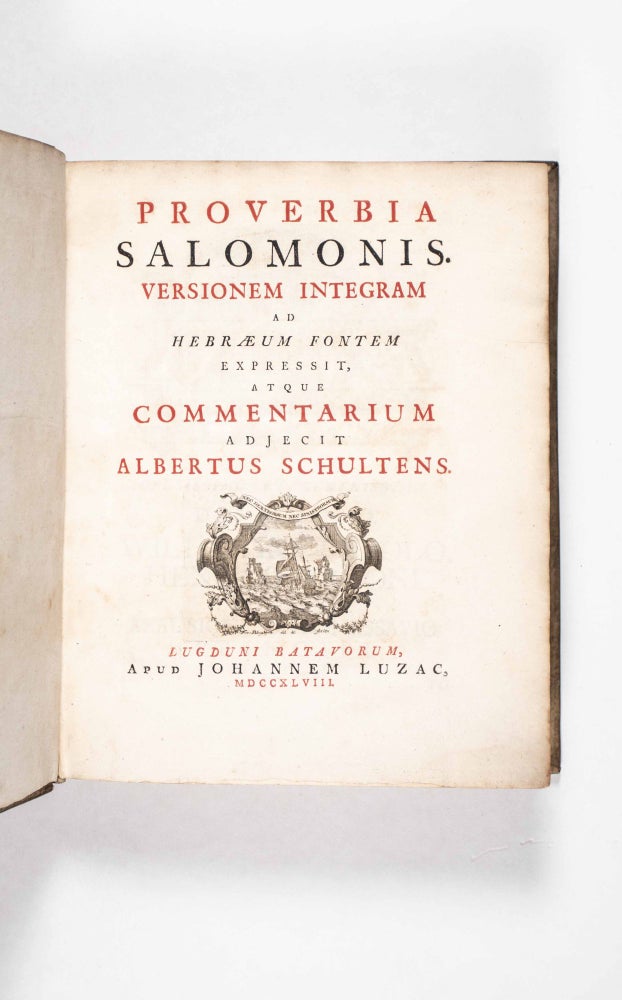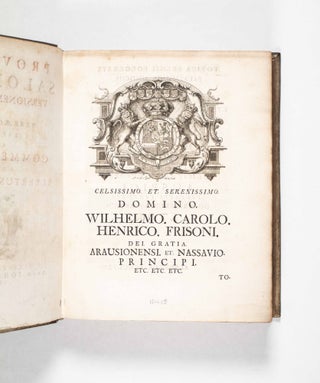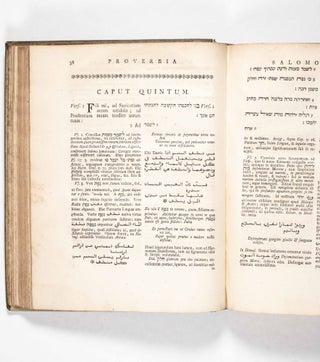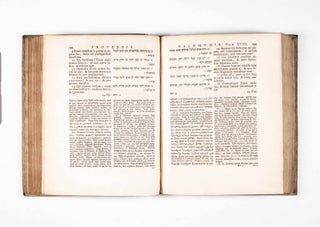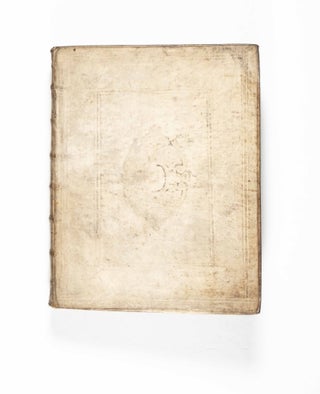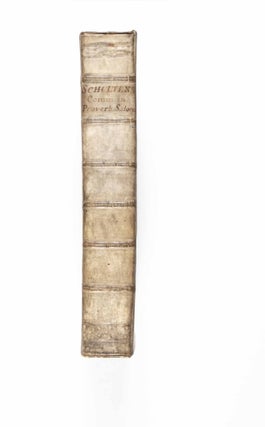Proverbia Salomonis. Versionem integram ad Ebraeum fontem expressit, atque Commentarium adjectit (The Proverbs of Salomon, Translated from the Hebrew, with a Commentary)
Leiden: Jean Luzac, 1748. First edition. Hardcover. Quarto. [8], cviii, 522, (60 indices & corrigenda)pp. Text in two columns, with Hebrew text and facing Latin translation interspersed with commentary. Title in red and black with engraved vignette; woodcut ornaments. Contemporary Dutch paneled vellum with blind-stamped vignettes and ruled borders; manuscript title at spine. Covers lightly soiled. Occasional touches of soiling and some leaves with mild embrowning. A very good copy, generally crisp and clean.
First edition of this comprehensive commentary to the biblical Book of Proverbs, by the Dutch semitic language scholar, Albert Schultens (1686-1750), who maintained "that the true nature of the Hebrew language, and the meaning of many of its words and idioms, are to be found chiefly in the Arabic" (Orme). Forty-one pages of the indices constitute a brief lexicon, and provide Latin as well as Arabic equivalents for more than 1000 Hebrew words. Schultens studied theology and eastern languages at Groningen, where he received his degree in theology in 1709. After a brief career as a preacher in Wassenaar he was nominated professor of Hebrew and Jewish antiquities at Franeker in 1713. In 1729 he decamped for Leiden were he was first appointed reader in eastern languages, and finally full professor in 1732.
At this time a chief concern of Calvinist theologians was to liberate Old Testament exegesis from Jewish (Rabbinic) as well as Catholic traditions. Schultens' influential and controversial solution was revealed as early as 1706 in his first public thesis, Disputatio theologico philologica de utilitate linguae Arabicae in interpretanda S. Scriptura (A Theologico-Philosophical Dissertation on the Utility of the Arabic Language for the Interpretation of the Holy Scriptures), "a forceful attack" (Brugman & Schröder) on the Protestant sola scriptura methodology of Biblical exegesis. "With the help of [Jacobus] Golius' Arabic dictionary, he perused with zeal and fervour the Old Testament and wrote prolifically... The lexical superiority of Arabic had led him to a reconsideration of the position of Hebrew: at first, he had called Arabic 'the most splendid daughter of mother Hebrew', but in his oration of 1729 he proclaimed Hebrew and Arabic cognate twin sisters. This shocked conservative theologians as an outright profanation of God's Word" (Brugman & Schröder).
Like his earlier commentary on the Biblical Book of Job, one here finds that the "Hebrew text and the Latin translation are all but totally submerged by the extensive commentary in which Schultens draws abundantly on Arabic texts such as the Hamasa, an anthology of early Arabic poetry by the ninth-century poet Abu Tammam" (Vrolijk & van Leeuwen). Schultens was not without his critics, and by 1824 William Orme notes a turning of the tide: "Different opinions are entertained of the correctness of his views, and also of his success in applying them; but it is now generally admitted that he carries his notions of the advantage of Arabic learning to the interpretation of the Scriptures too far."
Jean Luzac (1728-1777) was a member of a well-known Huguenot family of printers; he published many works for the University of Leiden, including three Hebrew books of Albert Schultens. Isaac van der Mijn is noted as the printer at the colophon of the second volume.
Provenance: bookplate of the Crozer Theological Seminary - Bucknell Library; bookseller's ticket of Librairie Ancienne et Moderne de Frederik Muller, Amsterdam at the front paste-down. Very Good. Item #49255
References: J. Brugman & F. Schröder, Arabic Studies in the Netherlands (Leiden: E.J. Brill, 1979), p.26f. Fuks/Fuks-Mansfeld 78. Orme, Bibl. Biblica, p. 390. A. Vrolijk & R. van Leeuwen, Arabic Studies in the Netherlands, a Short History in Portraits, 1580-1950 (Leiden: E.J. Brill, 2014), pp. 73-79.
Price: $600.00

